본문영역
본문영역
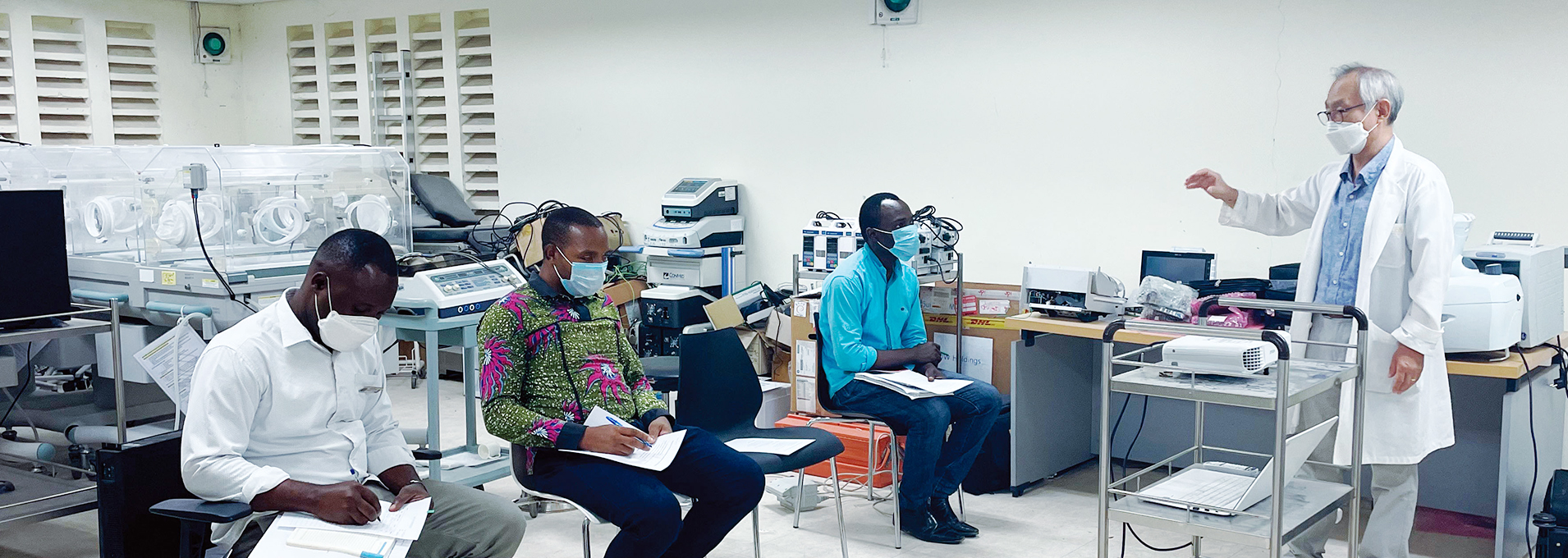
- Explore the World
- KOFIH Report I
-
From the establishment of hospitals to operational support
and education of medical staffSupport for overseas hospital
to operational support
and education of medical staff- Written by_ CHO Yun
- The Korea Foundation for International Healthcare (KOFIH) provides hospital operation consulting services to overseas hospitals to share Korea's advanced medical systems with partner countries. The official development assistance (ODA) programs for hospital operation are more than just constructing buildings; they should be accompanied by comprehensive consulting in finance, patient satisfaction, and hospital management. By means of this, support programs that can be linked with grant/loan support projects are necessary as part of the ODA advancement plan of the Office for Government Policy Coordination of the Republic of Korea. The purpose is to maximize the effect of ODA through a combination of paid support, such as hospital design and construction and hospital information service deployment; free support, such as consulting on organizational structure and hospital operation; dispatching advisory groups, and; experts training. Such hospital operation consulting project combined with grant/loan services will be a good opportunity to share Korea's development experiences, including the “K-quarantine” against COVID-19, in the overseas markets. Moreover, it is expected to open new opportunities for related industries in Korea in line with the increase in the partner countries’ capability to operate medical institutions in the future.
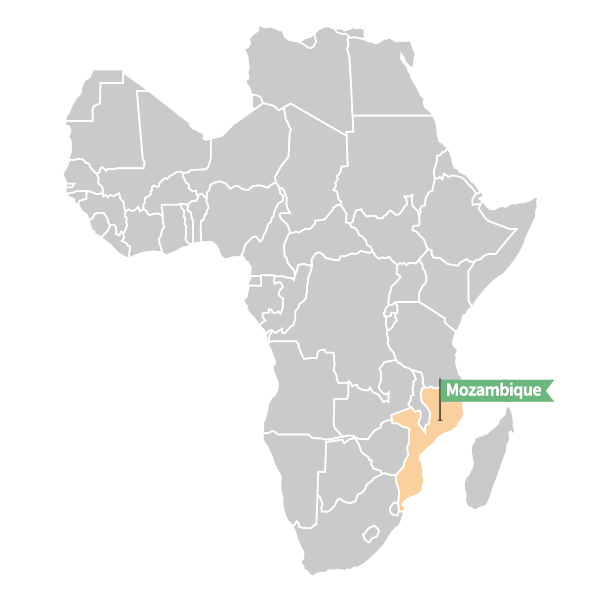

Mozambique
Consulting for hospital operation and management in Mozambique
Hospital Central de Quelimane (Quelimane Central Hospital) in Mozambique opened for services in 2016 with Korea’s Economic Development Cooperation Fund (EDCF). KOFIH formed a hospital opening preparation team with Inje University Paik Hospital in 2013 and executed the first consulting project until 2019. However, the Mozambique Ministry of Health has pleaded difficulties of hospital operation due to a lack of experience in operating general hospitals. Accordingly, KOFIH initiated the second consulting project in September last year to overcome the limitations of the first project and provide more continuous and systematic support. Based on the effective performance in the first project of creating a foundation for a regional quaternary and educational hospital, the second project is implemented with a focus on the regional community healthcare network.
The second project aims to (a) strengthen clinical and operational capabilities, (b) train medical personnel, and (c) improve awareness of healthcare in the local community. Two nursing professionals with extensive clinical experience were dispatched to the field as a first step. They helped improve work capacity in the intensive care unit, surgical ward, emergency room, and operating room, which were identified as vulnerable departments. After conducting 26 training sessions for 136 persons on blood transfusion, blood management, wound care, and artificial respiration, the project generated tangible results, such as a 3% or more improvement in the essential work competency of local medical staff and the ability to use medical devices.
The Zambezia region, including Quelimane Central Hospital, experienced a very high mortality rate of burn patients due to a lack of specialized burn treatment facilities. Moreover, the medical supply from India, a major source of pharmaceuticals, has become difficult due to the COVID-19 pandemic. Accordingly, the support group focused on supporting Quelimane Central Hospital to carry out its role as a quaternary hospital for regional burn center. Firstly, the project team implemented a collaborative system for burn patient treatment and provided specific consulting for treatment. Next, it received and supplied a list of items necessary for burn treatment and carried out cooperative programs with local hospitals.
The team also developed a curriculum of five courses in fundamental medicine for the second semester of the first year and two courses for the first semester of the second year to strengthen the capacity as a teaching hospital. A hospital information system (HIS) to be used by all departments was introduced as a measure for hospital quality assurance and quality improvement. HIS manages all hospital data, from patient registration to treatment and payment. Recognizing that HIS has improved hospital operation efficiency, the Mozambique Ministry of Health expressed deep satisfaction and indicated its intention to spread the system to other hospitals.
This phase of consulting fulfills a wide range of local needs, such as clinical trials, hospital operations, and the training of local medical staff. It is particularly meaningful that support is provided to link with communities with limited access to healthcare facilities amid the COVID-19 pandemic. The Quelimane Central Hospital consulting project focuses on securing sustainability by aiding the vulnerable departments until the scheduled project completion in 2023.
 Training of vulnerable departments of Quelimane Central Hospital in Mozambique
Training of vulnerable departments of Quelimane Central Hospital in Mozambique
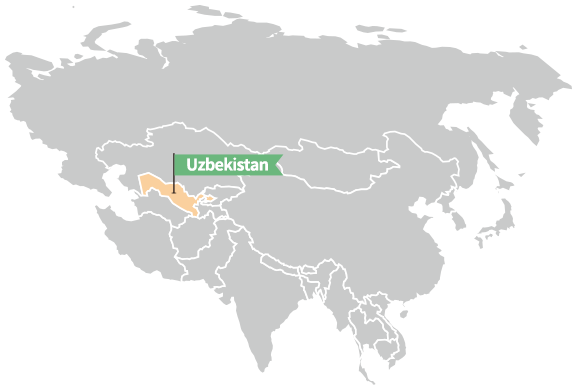

Uzbekistan
Hospital operation and management consulting project for Uzbekistan National Children’s Medical Center
According to the Uzbekistan Ministry of Health, the number of newborns in Uzbekistan was 840,000, and the death toll was 170,000 as of last year. It is a young country with a population increase of more than one million in two years. However, many children are born with congenital disorders, and two to three thousand newborns need surgery due to heart defects each year. As only up to 1,500 children can undergo heart surgery locally each year, the Uzbekistan government decided to build an international-level quaternary advanced children's hospital to strengthen its treatment capacity and request support from the Korean government. In response, KOFIH, EDCF, and the Korea International Cooperation Agency (KOICA) participated in grant/loan support project to open the National Children’s Medical Center in Uzbekistan.
KOFIH’s advisory group has executed five consulting projects since the two governments signed a loan agreement in November 2013. KOFIH dispatched an advisory group to consult the local Ministry of Health in the beginning and then formed a project implementation department to formulate an overall framework for the medical plan in consideration of the situation in Uzbekistan. KOFIH’s consulting focused on detailed operational plans of departments in clinical and administrative units—such as neuroscience, kidney and urinary care, pediatric surgery, specialized pediatric care, operating rooms, intensive care unit, emergency room, and nursing department. KOFIH established a hospital operating system, including outpatient treatment by specialists in each department, an inpatient doctor system, and a nursing organization centered on the assistant director of nursing, which is completely different from existing local hospitals. KOFIH also introduced paid hospital services, laying the foundation for self-sustenance.
As local hospitals have no names and are referred by the hospital number and department, KOFIH developed name, logo, and sign to build hospital identity. Advocating "the best children’s hospital in Central Asia for treatment of congenital disease," KOFIH focused on highlighting strengthened high-level treatment capabilities, for which there was no choice but to send patients abroad, including Russia, India, and Korea. Furthermore, the KOFIH support group provided consulting on attracting foreign patients through medical tours, cooperation with foreign university hospitals and non-governmental organizations, and acquiring hospital accreditation by international organizations to suggest a direction for establishing itself as a quaternary children's hospital.
There were tangible project outcomes. The overall competency evaluation index of the hospital’s key staff was 90.2%, surpassing the target of 87%. Patient satisfaction has also increased to 80% or higher of outpatients and 90% or higher of inpatients. It is also noteworthy that the project showed an increased efficiency with no duplicated services by thoroughly dividing roles through regular discussions with EDCF and KOICA, the partner organizations for the grant/loan consulting project.
The second consulting project that began this year will last until 2024, providing a more detailed analysis to help the local hospital establish its status as an independent operation. The goals are to (1) develop an emergency medical record system, (2) strengthen the quality and patient safety team capability, and (3) acquire the international hospital certification (JCI). KOFIH plans to form an advisory group to support the deployment of advanced hospital management systems.
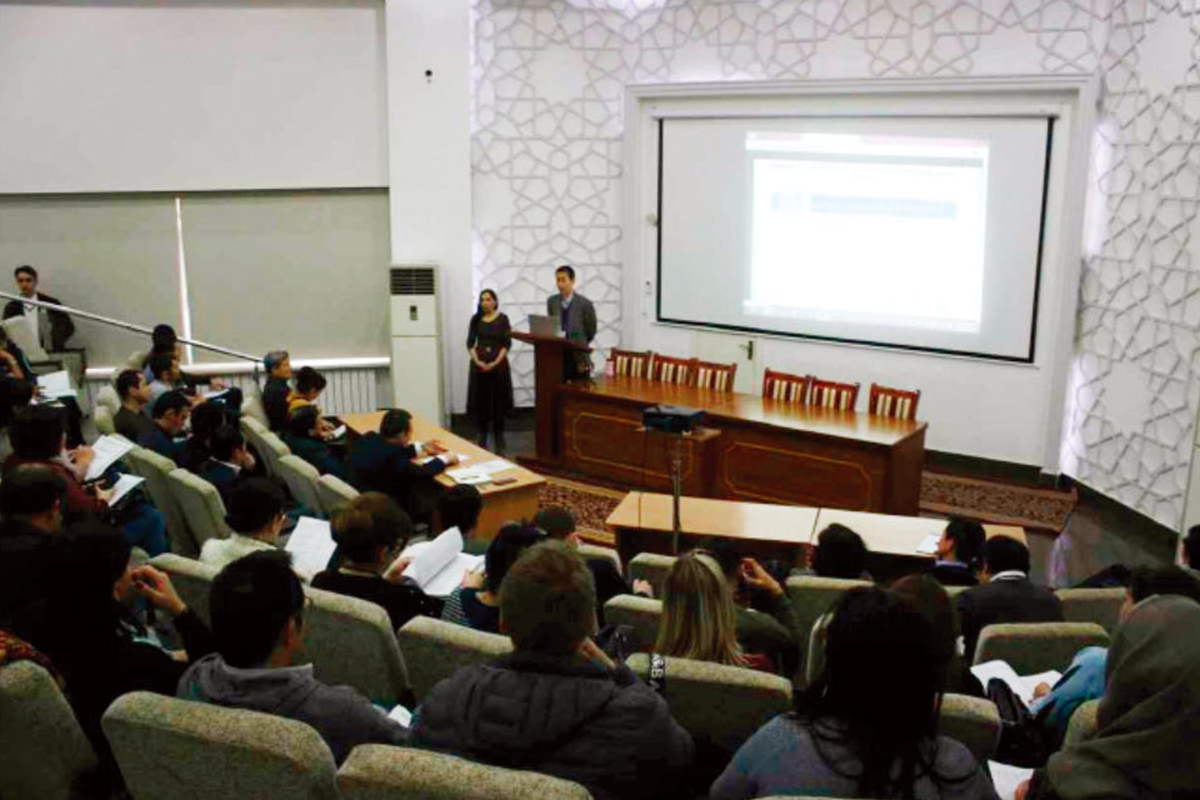 Local workshop conducted by the advisory group for the National Children’s Medical Center in Uzbekistan
Local workshop conducted by the advisory group for the National Children’s Medical Center in Uzbekistan
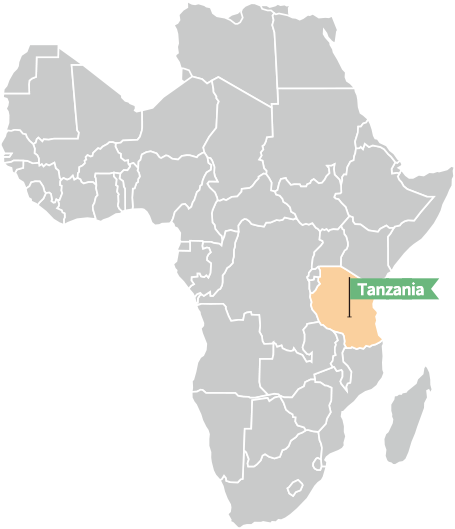
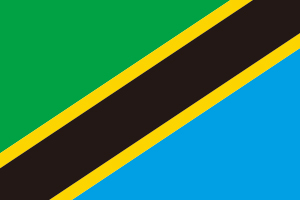
Tanzania
Consulting for the Muhimbili National Hospital-Mloganzila in Tanzania
Like other East African countries, Tanzania is vulnerable to tuberculosis and the human immunodeficiency virus (HIV), resulting in high infant mortality and low life expectancy. Their medical facility environment and human resources development have remained poor. In 2008, Tanzania's healthcare infrastructure accounted for only 9% of beds, 5% of nurses and midwives, and 1% of doctors per 1,000 population. The establishment of the Muhimbili National Hospital (MNH)-Mloganzila and the consulting project was naturally initiated to help to improve the situation of insufficient medical facilities and medical personnel.
The local office established in Dar es Salaam, the former capital of Tanzania, in 2017 is operated as a joint office with other aid agencies. KOFIH that is in control of technical cooperation such as hospital operation and management and EDCF of financial cooperation have jointly participated in the identification of projects at the initial stage and are providing grants and loans as a package. The second consulting project for the operation and management of the 600-bed MNH-Mloganzila, which opened in 2017, began in 2020. The goals are to (1) strengthen the capabilities of vulnerable departments, (2) increase hospital operation efficiency, and (3) reinforce the function as a teaching hospital. As a first step, KOFIH dispatched professionals to support and educate vulnerable departments, ranging from high-risk maternity and newborn centers to medical engineering departments. For the medical engineering department, the KOFIH professionals visited major hospital departments with local biomedical engineers to train medical device users. The doctors were consulted on complex cases for the obstetrics and gynecology department, and case studies were conducted to improve the diagnostic ability of specialists for the radiology department. Routine consultations and communicable disease prevention education, including three symposiums and 12 workshops, were provided for the nursing department. The medical staff generally showed high satisfaction, and the ventilator operation practice and patient nursing education, in particular, received a perfect rating of 5 points.
The suggestion to attach name tags with patient information to all hospital beds, including the intensive care unit, for system improvement has resulted in visual outcomes, such as the significant reduction of frequent medication errors. As the number of severe COVID-19 patients has recently increased, the surgical intensive care unit was used as isolation beds for severe COVID-19 patients, so consulting was also necessary. The dispatched experts advised on the practices of the quarantine ward, such as wearing and removing personal protective equipment, hand hygiene, rules for wearing masks, and waste disposal.
Specific plans to carry out the roles of a quaternary hospital as a teaching and research hospital were also presented. Clinical technology symposiums were held to provide opportunities to support research activities and strengthen the clinical capabilities of medical personnel. In particular, a cervical cancer management symposium was jointly conducted by the obstetrics and gynecology, radiology, and clinical pathology departments. For the symposium on diabetes during pregnancy, many medical professionals from the obstetrics and gynecology, internal medicine, pediatrics, and nutrition departments participated.
The project, which will last until December 2023, will further strengthen MNH-Mloganzila’s role as a quaternary hospital by dispatching emergency medical experts in the future. Moreover, KOFIH will acquire statistical and monitoring data to evaluate hospital services and then identify improvement opportunities. It is also planning to continue providing medical device repair parts to enable local maintenance.
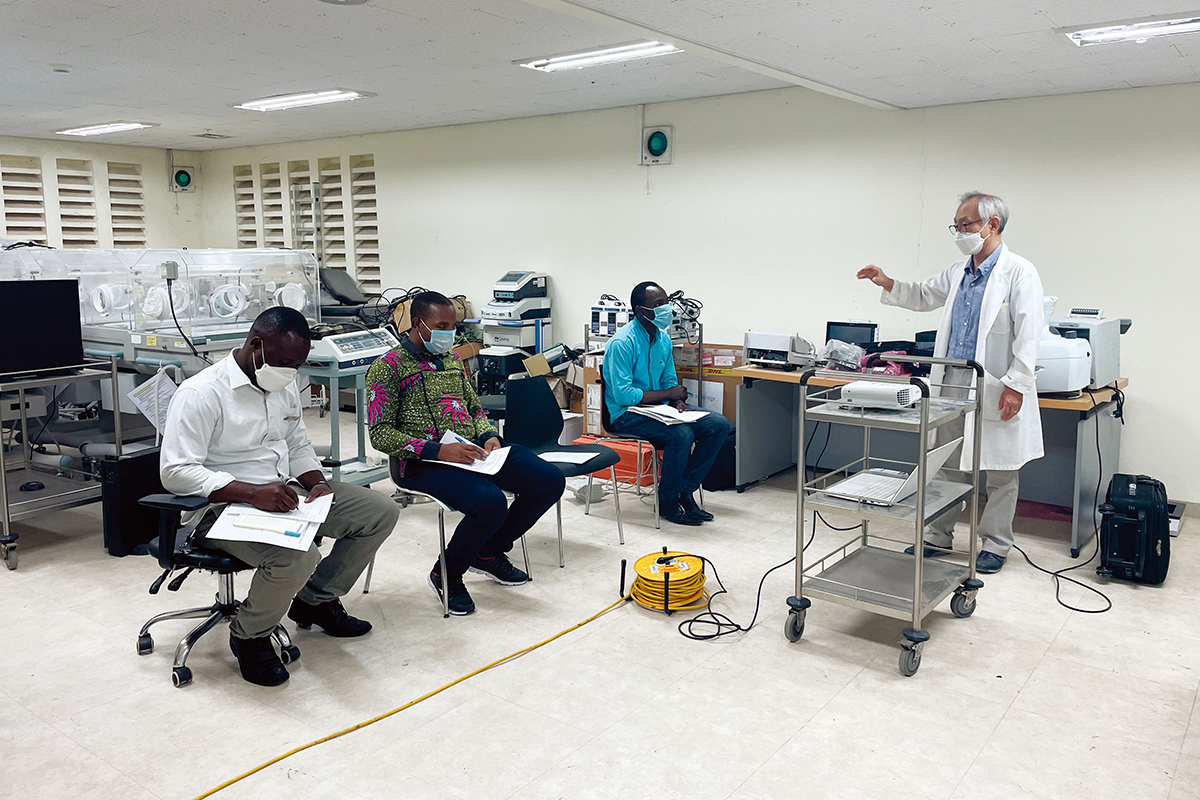 Training biomedical engineers in Tanzania by dispatched experts
Training biomedical engineers in Tanzania by dispatched experts
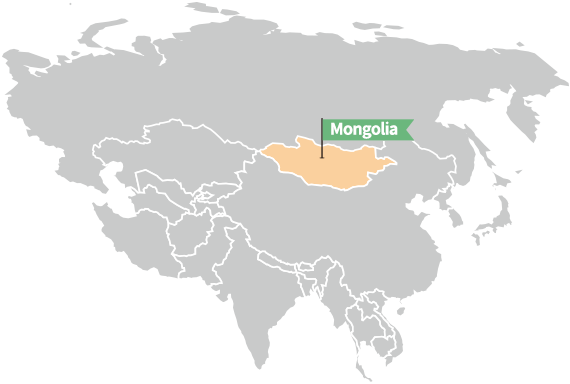
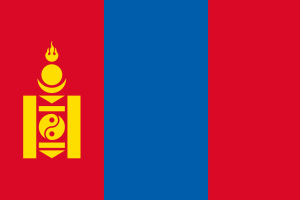
Mongolia
Nuclear medicine consulting for the Mongolian National Diagnostic and Treatment Center
In July last year, KOFIH successfully carried out a cancer diagnosis using a radionuclide for the first time in Mongolia. It was a positron emission tomography/computed tomography (PET/CT) for five breast and other cancer patients conducted at the Department of Nuclear Medicine of the Mongolian National Diagnostic and Treatment Center (NDTC). It was the first outcome of the joint project for nuclear medicine technology transfer by KOFIH and the Korea Institute of Radiological & Medical Sciences (KIRAMS).
NDTC, located within the Second State Hospital in Ulaanbaatar, the capital city, was also constructed in 2019 with the support of the Korean government. KOFIH and KIRAMS have jointly been conducting technical education projects for nuclear medicine technologists at NDTC since 2016. For five years, the two organizations have transferred the life-cycle technology, from radiopharmaceutical manufacturing using cyclotron (charged particle accelerator) to nuclear medicine image reading. They also contributed to producing radiopharmaceuticals (FDG) with Mongolia's technology for disease diagnosis last year.
The local consulting project has focused on supporting nuclear medicine technology based on PET/CT and cyclotron. The Korean experts have transferred their know-how on nuclear medicine operations throughout the life cycle. As a specific example, the project team deployed an online video system for advice on demand on the production and quality control of FDG, a type of medicine that can detect tissue abnormalities in cancer, brain, and heart by combining F-18 radionuclide for PET diagnosis with glucose molecules. Moreover, the team inspected the infrastructure of the radiopharmaceutical cleanroom, cyclotron room, and PET/CT imaging room. KOFIH and KIRAMS also focused on training the local medical staff. The 11-month-long invited training program provided in-depth education on PET/CT reading, single photon emission computed tomography/CT reading, understanding of radionuclides, and radiation safety. The education level varied according to the trainees' major, knowledge level, educational background, work experience, and language proficiency. Moreover, maintenance training was provided to improve the operational skill for seven trainees, and 23 lectures configured of fundamental in-depth practices were provided with English and Mongolian subtitles. The two organizations also provided expert advice on successful opening and stable operation of a nuclear medicine lab. They also provided facilities to create a local online education and seminar environment needed under the COVID-19 situation.
KOFIH plans to support the stable, independent operation of the nuclear medicine lab by reflecting local demand. Although the local consulting has faced difficulties such as the closure of the Mongolian border due to COVID-19, KOFIH has continued to provide support through alternative ways, such as online conferences and online education programs. 
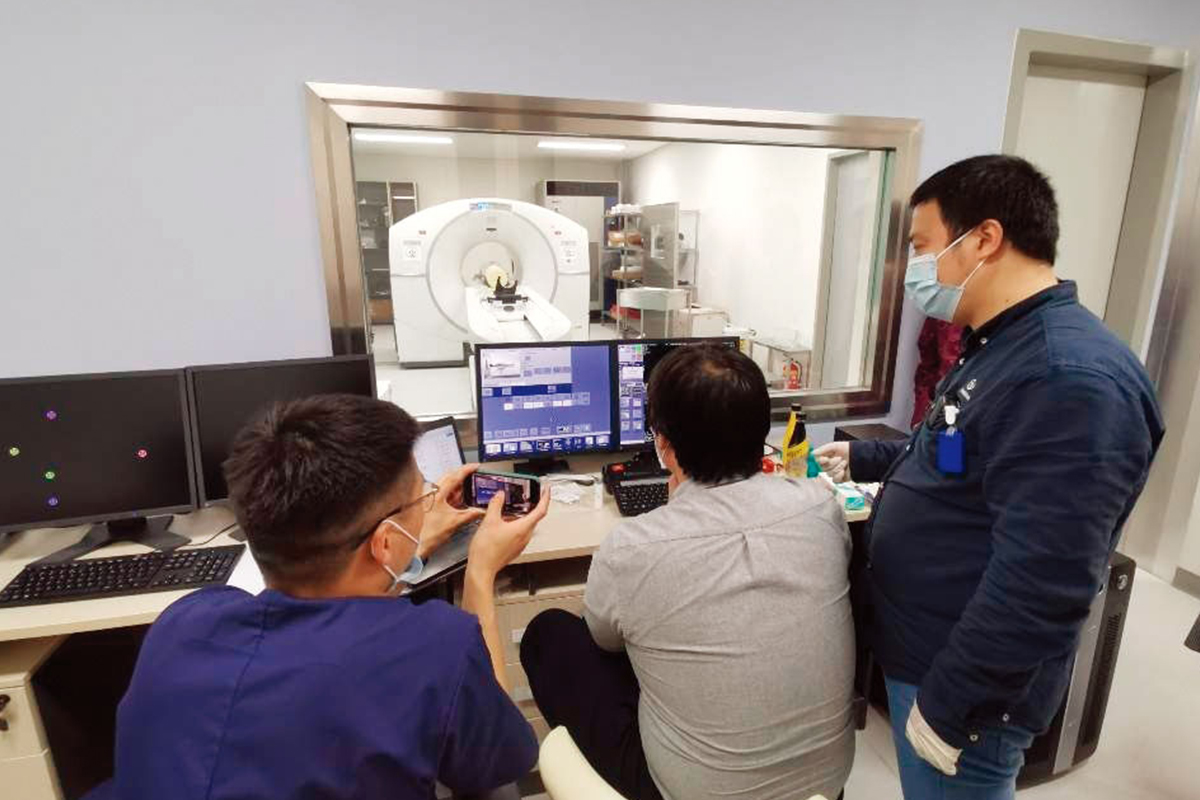 Reading a PET/CT image at the Mongolian National Diagnostic and Treatment Center
Reading a PET/CT image at the Mongolian National Diagnostic and Treatment Center


